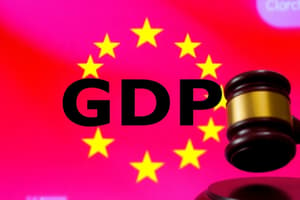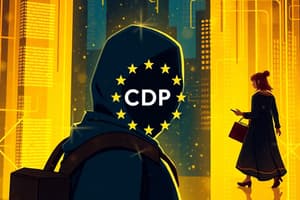Podcast
Questions and Answers
Users of closed source software have the ability to modify and improve the code for their own benefit.
Users of closed source software have the ability to modify and improve the code for their own benefit.
False (B)
Microsoft Office is an example of a proprietary license software.
Microsoft Office is an example of a proprietary license software.
True (A)
The source code of closed source software can be freely accessed and viewed by users.
The source code of closed source software can be freely accessed and viewed by users.
False (B)
In proprietary software, the company is obligated to provide updates as stated in the terms and conditions.
In proprietary software, the company is obligated to provide updates as stated in the terms and conditions.
Users of proprietary software retain ownership of the software once purchased.
Users of proprietary software retain ownership of the software once purchased.
GDPR was introduced in 2018 to enhance data protection for people in the UK.
GDPR was introduced in 2018 to enhance data protection for people in the UK.
A data subject is a person whose data is stored and processed by an organization.
A data subject is a person whose data is stored and processed by an organization.
The Information Commissioner in the UK has no responsibility regarding the Data Protection Act.
The Information Commissioner in the UK has no responsibility regarding the Data Protection Act.
It is possible to be fined for accidentally breaking the principles outlined in the Data Protection Act.
It is possible to be fined for accidentally breaking the principles outlined in the Data Protection Act.
Under the Data Protection Act, copying work without permission can lead to legal action for copyright infringement.
Under the Data Protection Act, copying work without permission can lead to legal action for copyright infringement.
Open source software allows users to view and modify the source code.
Open source software allows users to view and modify the source code.
Software licenses only include open source and do not cover any other usage rights.
Software licenses only include open source and do not cover any other usage rights.
Once an image is uploaded to the internet, it is easy to trace who has stolen it.
Once an image is uploaded to the internet, it is easy to trace who has stolen it.
Flashcards
Proprietary License
Proprietary License
A type of software license where the source code is hidden and users cannot modify or inspect it.
Data Subject
Data Subject
A person whose personal data is being collected and processed.
Data Controller
Data Controller
An organization that decides what personal data is collected, how it's used, and for what purposes.
Data Commissioner
Data Commissioner
Signup and view all the flashcards
Data Protection Act (2018)
Data Protection Act (2018)
Signup and view all the flashcards
Open Source Software
Open Source Software
Signup and view all the flashcards
Proprietary Software
Proprietary Software
Signup and view all the flashcards
Copyright
Copyright
Signup and view all the flashcards
Copyright Infringement
Copyright Infringement
Signup and view all the flashcards
Information Commissioner
Information Commissioner
Signup and view all the flashcards
Study Notes
GDPR and Data Protection Act (2018)
- The EU's GDPR (General Data Protection Regulation) protects EU citizens' data privacy.
- The UK updated its Data Protection Act (1998) to the Data Protection Act (2018).
- This act covers data stored on computers and processed by organizations.
- A "data subject" is any individual whose data is processed.
- The "data controller" is the employee responsible for registering with the Information Commissioner.
- The Information Commissioner manages UK data protection laws.
Data Protection Act (2018) Details
- The Act was introduced due to increased computer use.
- Aims to prevent and punish misuse of computer data.
- Enforcing the principles is a criminal offence.
- Penalties include fines and imprisonment, but only for intentional breaches.
- Illegal to copy copyrighted work (text, images, music, videos, software) without permission.
- Copyright holders can sue infringers despite the internet's ease of copying.
- Tracing infringement is hard once spread online.
Software Licenses Explained
- Software licenses define legal software use.
- Open source: Users can view and change the source code.
- Customizable to specific needs.
- Often shared for collaborative improvements.
- Potential issues with support due to distributed development.
- Source code may have errors if not rigorously tested.
- Requires technical skills for effective adaptation and maintenance.
- Proprietary (Closed Source): Users cannot view or alter the source code.
- Users buy the right to use, but not own, the software.
- Examples: Microsoft Office, Fortnite, Spotify.
- Typically well-tested by professional developers.
- Updates and support depend on the software provider.
- Provider can be held accountable for non-performance.
Benefits and Drawbacks of Software Types (Open Source and Closed Source)
- Open Source Software
- Benefits: Customizable, collaborative development, often cheaper.
- Drawbacks: Potentially less reliable support, possible errors, requires technical expertise.
- Closed Source Software
- Benefits: Updated & maintained professionally, usually more reliable and secure, often easier to use.
- Drawbacks: Users may not have customization options, less flexibility.
Studying That Suits You
Use AI to generate personalized quizzes and flashcards to suit your learning preferences.




